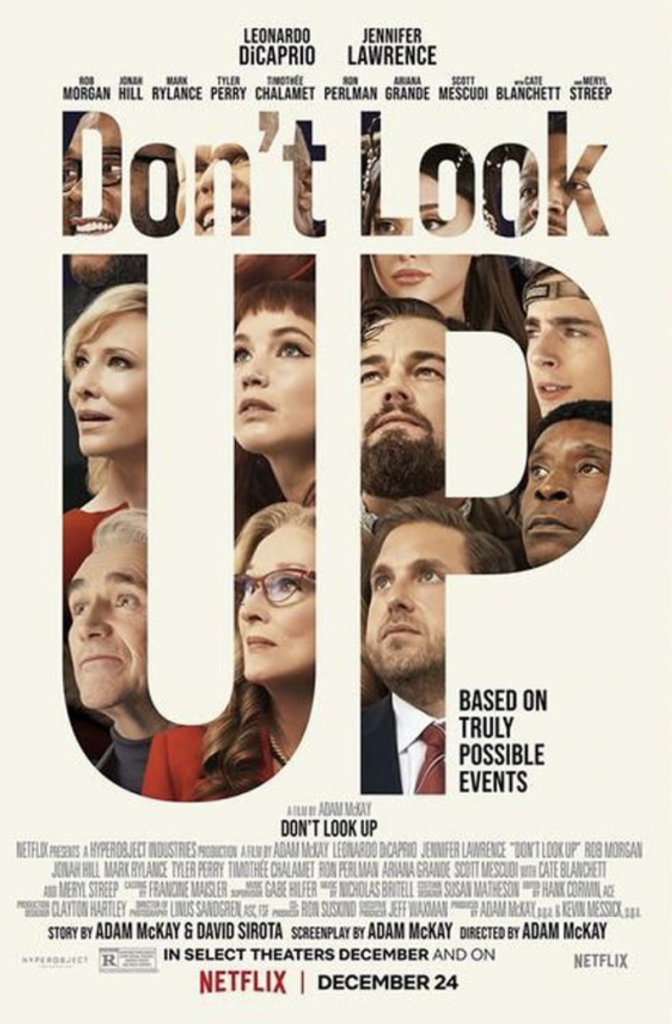Don’t Look Up: Last laugh or last gasp?
 by Ted Giese
by Ted Giese
In Don’t Look Up, director Adam McKay uses the fictional threat of an impending Earth-bound comet impact and reaction to this news as an allegory for climate change. Written prior to the COVID-19 pandemic but with filming starting in 2020, the movie takes on an additional layer of complexity when viewed through the lens of government, media, industry, and public reaction to the health crisis still swamping the world as the film hit Netflix in December 2021.
The story begins when Michigan State professor of astronomy, Dr. Randall Mindy, confirms the discovery of a massive comet by Ph.D. candidate Kate Dibiasky, and quickly raises the alarm after determining that the kilometres-wide planet killer’s trajectory has a 99.78% certainty of hitting Earth. Mindy and Dibiasky contact NASA, alerting Dr. Oglethorpe at the Planetary Defense Coordination Office. The three scientists’ dire warning of an impending extinction event meets resistance and opposition from government, media, and Silicon Valley big tech. Government action is only taken when it is politically expedient; media interest perks up due to Mindy’s handsome looks; and big tech only becomes involved when the looming comet proves to be potentially profitable.
While the threat is similar, director Adam McKay’s Don’t Look Up is not a retread of Michael Bay’s corny blue-collar rah-rah America action thriller Armageddon or Mimi Leder’s Deep Impact. Instead, McKay’s satirical comedy falls somewhere between Stanley Kubrick’s highbrow warning of the dangers of nuclear warfare Dr. Strangelove or: How I Learned to Stop Worrying and Love the Bomb and Mike Judge’s lowbrow warning of the dangers of overpopulation Idiocracy.
Don’t Look Up establishes the theme of science vs. faith early in the story. After the comet is confirmed and they are about to plot its trajectory, Dr. Mindy asks his graduate students the cheeky semi-rhetorical question, “What would Sagan do?” referring to the popular astronomer and astrophysicist Carl Sagan—a twist on the pop-Evangelicalism slogan “What would Jesus do?” This low-grade pro-science mocking of Christian faith establishes a starting point for these characters. However, both Dr. Mindy and Dibiasky quickly become disillusioned by the short-sightedness of everything in which they place their trust: government, the theoretical and applied scientific community, media, even the military. By the end of the film this leaves them open to the possibility of faith and God. Mindy in particular embarks on a kind of epic hero’s journey where he leaves home, fights his battles, and eventually returns home a new man.
Don’t expect to see Jesus return at the end of the film. For McKay, the end of earth is simply the end of humanity with a 99.78% certainty.
Once government, media and big tech become engaged in the problem, Mindy is enticed into their service as a scientific advisor and public figure. Repeatedly, he is forced to compromise his faithfulness to science in the hope that the misguided and clueless authorities holding the reins of power will save humankind from destruction. Away from his family and wife June, Mindy is tempted into an adulterous affair with Brie Evantee, the narcissistic cohost of the cable television show “The Daily Rip.” When Mindy hits his breaking point, he invokes God, and falls out of favour with everyone using him to their personal advantage. In the end, with the comet fast approaching, Mindy returns to his wife and family, repentant and seeking forgiveness—which his wife gives him. She in turn confesses her own long past infidelity. This is one touching example in the life of the central characters where faith wins out.
Another example is connected to Kate Dibiasky, who unexpectedly finds herself in a romance with a slacker skateboarding shoplifter Yule. He confesses to her that he is an Evangelical but asks her not to tell anyone as it would ruin his street cred. At first, she thinks this is sweet but by the end of the film, surrounded by Dr. Mindy’s family and their friend Dr. Oglethorpe, her now fiancé Yule offers to pray and to everyone’s surprise prays, “Dearest Father and Almighty Creator, we ask for Your grace tonight, despite our pride. Your forgiveness, despite our doubt. Most of all, Lord, we ask for Your love to soothe us through these dark times. May we face whatever is to come in Your divine will with courage and open hearts of acceptance. Amen.” Science was not providing any of this to Dibiasky and Mindy.
This heartfelt prayer contrasts with a prayer offered by Jason Orlean, the White House Chief of Staff and son of President Janie Orlean as Big Tech is about to launch a mission to mine the comet for its minerals and resources. He comments that there have been a lot of people talking about praying for people but, as he puts it, “There’s dope stuff, like material stuff, like sick apartments and watches, and cars, and clothes and s**t that could all go away, and I don’t wanna see that stuff go away. So, I’m gonna say a prayer for that stuff. Amen.”
McKay’s satirical comedy falls somewhere between Stanley Kubrick’s highbrow warning of the dangers of nuclear warfare Dr. Strangelove or: How I Learned to Stop Worrying and Love the Bomb and Mike Judge’s lowbrow warning of the dangers of overpopulation Idiocracy.
Mindy’s and Dibiasky’s faith in science was not undermined by the science itself but by those who failed to act on it out of altruistic principles. Their ideological approach to science was tested and found wanting in the face of power-hungry, greedy, self-interested megalomaniacs. Taking into account when Don’t Look Up was conceived and written, President Orlean comes across as a thinly veiled liberal caricature of Donald Trump. Similarly, the Silicon Valley tech guru and CEO of Bash Cellular, Peter Isherwell, is an amalgam of sorts of Apple CEO Tim Cook, Amazon founder Jeff Bezos, Meta/FaceBook CEO Mark Zuckerberg, and Tesla/SpaceX CEO Elon Musk.
On the surface both President Orlean and Big Tech’s Isherwell are depicted as grifters and profiteers. But with the awkward and off-putting Isherwell, McKay seems to hint at something darker. Isherwell is referred to as a “Platinum Eagle-level” donor to President Orlean’s campaign, giving him unfettered access to the President. As a maker of mobile phones, he is also thoroughly entrenched in the world of algorithms where life is dissected, evaluated, and manipulated moment by moment for monetary gain and control. He claims the ability to know the hour and method of a person’s death based on their online activity, telling Mindy that the astronomer will “die alone.” Early in the film, Isherwell launches his new BASH Cellular phone called BASH LiiF with the creepy tagline “Life, without the stress of living.” Later, after scuttling a government plan to destroy the comet with an armada of nuclear bombs, Isherwell calls himself Cronos the mythological Greek god of time as he talks to an A.I. robot that he refers to as his child, Primo, who will lead the mission to break up the comet to mine its valuable resources. Introducing Primo to Mindy and Orlean, Isherwell says to the robot “Don’t be shy. Come on. You’re gonna be a god in the sky.”
 In Don’t Look Up Isherwell represents a kind of godless postmillennial materialism where a small group of people firmly believe everything will continue to improve not because of God’s work but because of the promethean work of humanity which gives society’s elites the ability to storm heaven and take their own stab at a golden Garden of Eden. The film even ends with a cryogenically-suspended Isherwell, Orlean, and a group of lobbyists and captains of industry and their chosen few escaping earth on a spaceship to find a new habitable planet in the “Goldilocks zone,” of some distant solar system. There they walk naked, like Adam and Eve, into an untouched paradise—a new Eden—where they could presumably fire up their corporate, capitalistic exploitative machine and spoil a brand new planet for their personal gain. Comedically McKay paints this as hubris, a hopeless attempt to do the impossible. In a credits epilogue scene that could have come straight out of Mike Judge’s Idiocracy, the new planet proves just as fallen and dangerous as the one they escaped.
In Don’t Look Up Isherwell represents a kind of godless postmillennial materialism where a small group of people firmly believe everything will continue to improve not because of God’s work but because of the promethean work of humanity which gives society’s elites the ability to storm heaven and take their own stab at a golden Garden of Eden. The film even ends with a cryogenically-suspended Isherwell, Orlean, and a group of lobbyists and captains of industry and their chosen few escaping earth on a spaceship to find a new habitable planet in the “Goldilocks zone,” of some distant solar system. There they walk naked, like Adam and Eve, into an untouched paradise—a new Eden—where they could presumably fire up their corporate, capitalistic exploitative machine and spoil a brand new planet for their personal gain. Comedically McKay paints this as hubris, a hopeless attempt to do the impossible. In a credits epilogue scene that could have come straight out of Mike Judge’s Idiocracy, the new planet proves just as fallen and dangerous as the one they escaped.
Don’t Look Up is a deeply frustrating film. On the one hand, when facing death with his family and closest friends, Dr. Mindy waxes eloquently: “We really did have everything, didn’t we? I mean, when you think about it.” On the other hand, the film is littered with a litany of snide comments and crass blasphemies intended to paint a portion of the American population as hopelessly inept. Faith wins out for a handful of people, and the film ultimately reads something like the parable of the Narrow Door where Jesus is asked, “Lord, will those who are saved be few?” Jesus answers, “Strive to enter through the narrow door. For many, I tell you, will seek to enter and will not be able,” with the additional warning about self-righteousness unhinged from God “And behold, some are last who will be first, and some are first who will be last” (Luke 13:22-30). As the film opens, Mindy and Dibiasky would be considered last in line to be part of the kingdom of God. But by the end, this is flipped on its head. While the world loses its collective mind, revelling in sex, drugs, greed, and violence, these characters find their minds and souls sitting quietly around a table sharing a prayer and a meal.
In Don’t Look Up Isherwell represents a kind of godless postmillennial materialism where a small group of people firmly believe everything will continue to improve not because of God’s work but because of the promethean work of humanity which gives society’s elites the ability to storm heaven and take their own stab at a golden Garden of Eden.
Of course, that’s a generous read of the film’s faith vs. science themes. A more critical eye might ask whether these and other details are merely an attempt to cut through the static from the modern media landscape in hopes of getting noticed and commented upon. Casting Ariana Grande, for example, as a pop R&B singer in a sub-plot about the vapid nature of celebrity provides real world access to Grande’s fans and social media. Even this review and others like it, on a much smaller scale, provide free publicity for McKay and his investors. And the inclusion of a hero journey that ends with a heartfelt scene of forgiveness and prayer could be interpreted simply as a way to engage the Christian demographic. Satire is hard because it is the kind of comedy that doesn’t ask you to take it lightly but rather to take it seriously.
As a whole, Don’t Look Up is undermined by the pandemic. With President Trump out of office, and with COVID-19 having driven public and private policy and health guidelines, it’s hard to buy into a satirical film intended to convince the public that media, industry, and government have a problem taking science seriously. A big hint that the movie might be a colossal inside joke, a kind of deliberate trolling, is that the Dibiasky comet is a comet and not an asteroid. Comets are mostly water and dust and don’t pose the same kind of threat as a rocky mineral-rich asteroid. It’s hard to believe a film so obsessed with minutia would miss this detail. This contradiction is constantly placed before viewers with special effects making it look like an asteroid despite being called a comet.
The film, however, does a good job of plumbing North American anxiety surrounding death and dying. Interestingly, Isherwell’s prediction about how Dr. Mindy would die proves incorrect; he doesn’t die alone. And despite Isherwell’s data and computer models, events don’t entirely unfold as he predicts for himself either. This should be a hint that McKay cares about where viewers place their faith and hope. By his own admission, he is terrified of climate change and hopes his film’s message will resonate with viewers. That said, not all viewers will laugh along with this satire; it has some very sharp edges not everyone will appreciate. It will be interesting to see how viewers react to this film in about twenty years providing the people of today are still around in twenty years to see it.

Don’t expect to see Jesus return at the end of the film. For McKay, the end of earth is simply the end of humanity with a 99.78% certainty.
———————
Rev. Ted Giese is lead pastor of Mount Olive Lutheran Church, Regina, Saskatchewan, Canada; a contributor to The Canadian Lutheran, Reporter; and movie reviewer for the “Issues, Etc.” radio program. For more of his television and movie reviews, check out the Lutheran Movie Review Index.






